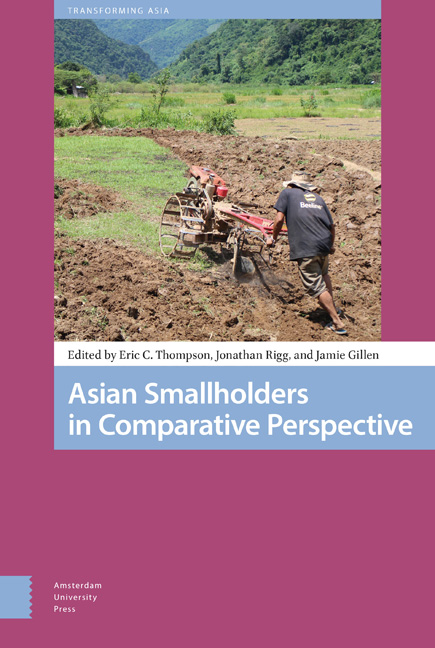Book contents
- Frontmatter
- Contents
- List of Maps, Figures and Tables
- Preface
- Introduction: Asian Smallholders in Comparative Perspective
- 1 Cambodia: Political Strife and Problematic Land Tenure
- 2 Indonesia: Whither Involution, Demographics, and Development?
- 3 Japan: Government Interventions and Part-time Family Farming
- 4 Laos: Responding to Pressures and Opportunities
- 5 Malaysia: The State of/in Village Agriculture
- 6 The Philippines: Fragmented Agriculture , Aquaculture, and Vulnerable Livelihoods
- 7 Singapore: Making Space for Farming
- 8 Taiwan: Toward the Revitalization of Smallholder Agriculture
- 9 Thailand: The Political Economy of Post-Peasant Agriculture
- 10 Vietnam: From Socialist Transformation to Reform
- Index
7 - Singapore: Making Space for Farming
Published online by Cambridge University Press: 21 November 2020
- Frontmatter
- Contents
- List of Maps, Figures and Tables
- Preface
- Introduction: Asian Smallholders in Comparative Perspective
- 1 Cambodia: Political Strife and Problematic Land Tenure
- 2 Indonesia: Whither Involution, Demographics, and Development?
- 3 Japan: Government Interventions and Part-time Family Farming
- 4 Laos: Responding to Pressures and Opportunities
- 5 Malaysia: The State of/in Village Agriculture
- 6 The Philippines: Fragmented Agriculture , Aquaculture, and Vulnerable Livelihoods
- 7 Singapore: Making Space for Farming
- 8 Taiwan: Toward the Revitalization of Smallholder Agriculture
- 9 Thailand: The Political Economy of Post-Peasant Agriculture
- 10 Vietnam: From Socialist Transformation to Reform
- Index
Summary
Abstract
Singapore is rarely associated with small-scale farming. Since the 1960s, the government has instituted policies based on high-density urbanization, moving the population out of rural and peri-urban villages into high-rise government-managed housing. Nevertheless, smallholder agriculture has persisted on the urban fringe in the form of agro-technology parks. This chapter examines the social and governmental forces through which agriculture has persisted in urban and industrially oriented Singapore. Organized small-farmer activism has been key to sustaining a peripheral smallholder base, though it remains highly precarious and suffers from ambivalence toward the position of agriculture in the city state.
Keywords: agro-technoparks, Kranji Countryside Association (KCA), leaseholds, Singapore, smallholders, urban planning
Singapore is not a country typically known for its agriculture. At present only 1% of Singapore's land area has been allocated by its government for agricultural purposes. Despite its seeming irrelevance however, Singapore is actually an intriguing case for the study of smallholders and their persistence, for a number of reasons. First, Singapore presents a case where a country has gone from a position of enjoying close to total self-sufficiency in a range of food products, to a position of depending on imports to satisfy around 90% of its domestic food needs – all in the space of approximately 35 years, from the 1980s to the present day. Furthermore, contrary to common assumptions, the early stages of Singapore's industrialization in the 1960s proved very beneficial to the local farming sector, which increased yields produced despite decreasing acreage. In fact, the innovation and quality of local farming methods had been evident as early as Singapore's colonial era, when family farms managed to thrive despite the catastrophic failure of colonial plantation agriculturalists from the East India Trading Company. Even with their privileged access to advanced technology and financial capital, colonial plantations could not survive and were even grossly outperformed by family farms which only had very limited access to labour, capital, and technologies of the day. While Singapore has undergone tremendous changes since colonial times, smallholder and small-scale agriculture has persisted.
This chapter will show, firstly, that smallholdings in the past several decades have expanded into pockets of spaces not specifically reserved for agriculture by the state, and secondly, that the state itself – having vested interests in local agriculture – has played no small role in providing smallholders with much-needed resources over the years.
- Type
- Chapter
- Information
- Asian Smallholders in Comparative Perspective , pp. 213 - 238Publisher: Amsterdam University PressPrint publication year: 2019

